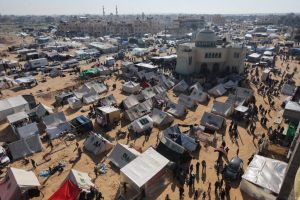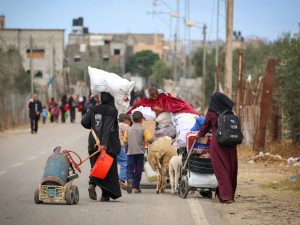displacement of Palestinians: The geopolitical landscape of the Middle East is in a state of profound flux, shaped by the ongoing conflict in Gaza and the complex web of alliances that define the region. A pivotal moment in this evolving dynamic occurred when the United Arab Emirates (UAE), a key Arab state and a signatory to the Abraham Accords, publicly supported Egypt and issued a strong condemnation of Israeli Prime Minister Benjamin Netanyahu’s controversial statements regarding the potential displacement of Palestinians from the Gaza Strip.
The Historical Context: From the Nakba to Netanyahu: displacement of Palestinians
This move was not merely a diplomatic formality but a significant strategic statement. It underscored the UAE’s delicate balancing act:
maintaining its normalized relations with Israel while firmly anchoring its foreign policy to core Arab principles, particularly the unequivocal rejection of any forced population transfer.
This article will explore the historical context, the immediate triggers, the strategic calculations behind the UAE’s position, and the broader implications for regional stability and the future of the Israeli-Palestinian conflict, with a consistent focus on the central issue of the potential displacement of Palestinians.
To fully understand the gravity of Netanyahu’s statements and the fierce reaction they provoked, one must first appreciate the deep-seated historical trauma that the concept of population transfer represents for Palestinians.
The foundational event of the modern Palestinian experience is the Nakba, or “catastrophe,” of 1948, which involved the mass exodus and displacement of Palestinians from their homes during the establishment of the State of Israel.
This event is not a distant historical memory but a living, breathing element of Palestinian identity and collective consciousness.
For decades, the right of return for these refugees and their descendants has been a central, non-negotiable pillar of any potential Palestinian peace platform.
Any suggestion, whether implicit or explicit, of a repeat of this trauma is therefore met with immediate and universal condemnation across the Arab and Muslim world.
It touches upon the deepest fears of the Palestinian people and is viewed as a direct threat to their very existence as a national group.
The rhetoric from certain far-right factions in the Israeli government, advocating for the resettlement of Gazans outside of Gaza, is seen through this historical lens.
When Prime Minister Netanyahu himself appeared to endorse or entertain such ideas, it crossed a fundamental red line, evoking the historical specter of the Nakba and signaling a potential policy direction that the Arab world, including its more moderate states like the UAE, could not and would not ignore.
The historical precedent makes the modern fear of a second, mass displacement of Palestinians a powerful and mobilizing force.
The Immediate Catalyst: Netanyahu’s Provocative Statements
In late December 2023 and early January 2024, as the Israeli military campaign in Gaza intensified, Prime Minister Benjamin Netanyahu made a series of statements that sent shockwaves through the region.
While advocating for the demilitarization of Gaza and Israel’s continued security control, he also spoke of the need for “emigration” and “voluntary migration” of Gazans.
To many listeners, the use of the word “voluntary” was a cynical euphemism, as the context of relentless bombardment, widespread destruction, and a severe humanitarian crisis made a truly voluntary choice impossible.
These comments were perceived as a brazen endorsement of a long-standing goal of the Israeli far-right: the reduction of Palestinian presence in the land and the effective thwarting of any future Palestinian state.
Netanyahu’s remarks were immediately interpreted as a trial balloon, testing international and regional reactions to the idea of a new, large-scale displacement of Palestinians.
The primary proposed destination for this potential exodus was the Sinai Peninsula in Egypt. This placed Egypt, a historic leader in the Arab world and a key mediator in the conflict, in an extremely difficult position.
It was at this critical juncture that the UAE chose to intervene forcefully.
The UAE’s Firm Condemnation: A Strategic Calculation
The UAE’s Foreign Ministry issued a clear and unambiguous statement. It strongly condemned Netanyahu’s suggestions, labeling them as “serious and provocative” and a direct threat to regional security and stability.
Crucially, the statement affirmed the UAE’s “categorical rejection of any measures that would threaten the displacement of Palestinians from their land.”
Furthermore, it expressed the UAE’s “full support for the Arab Republic of Egypt in its rejection of the displacement of Palestinians into its territories.”
This was a multifaceted move, driven by several overlapping strategic interests:
-
Upholding Arab Sovereignty and Stability: The UAE, as a status-quo oriented power, has a vested interest in regional stability. The forced transfer of hundreds of thousands of Palestinians into Egypt’s Sinai would have catastrophic consequences. It would likely destabilize Egypt, a crucial UAE ally, potentially turning Sinai into a new, permanent zone of conflict and radicalization. This would directly threaten the security of the entire region, including the Gulf states. By supporting Egypt, the UAE was acting to prevent a major geopolitical crisis on its doorstep.
-
Protecting the Abraham Accords: The normalization agreements between Israel and several Arab states, including the UAE, were built on a foundation of mutual economic and security interests. However, they were also predicated, from the Arab perspective, on the understanding that they would eventually lead to a improved conditions for Palestinians and a viable path to statehood. Netanyahu’s war strategy in Gaza and his rhetoric on displacement severely tested this premise. The UAE’s condemnation served as a stark warning to Israel that the continuation of the Abraham Accords framework is contingent upon Israel not crossing certain red lines, with the forced displacement of Palestinians being the brightest of those lines. It was a move to salvage the long-term potential of normalization by pressuring Israel to moderate its course.
-
Domestic and Pan-Arab Legitimacy: Despite its modern and outwardly cosmopolitan image, the UAE leadership is still attentive to public sentiment and broader Arab opinion. The Palestinian cause remains a powerfully resonant issue among Arab populations. Openly supporting, or even being perceived as silently condoning, actions that could lead to the displacement of Palestinians would be domestically problematic and would severely damage the UAE’s standing and leadership credentials in the Arab world. Taking a firm stand allowed the UAE to burnish its Arab identity and demonstrate that its peace with Israel did not come at the expense of fundamental Palestinian rights.
-
Positioning as a Responsible International Actor: The UAE, through its non-permanent membership on the UN Security Council and its hosting of COP28, has sought to project an image of a responsible, mediating global power. Endorsing or ignoring calls for population transfer would be anathema to international law and UN resolutions. By taking a principled stand, the UAE aligned itself with the overwhelming consensus of the international community, which uniformly rejects any form of forced displacement.
Egypt’s Stance and the UAE’s Solidarity
Egypt’s rejection of any scenario involving the transfer of Gazans into Sinai is absolute and non-negotiable. This position is rooted in profound national security concerns.
Egypt already faces a persistent insurgency in Northern Sinai; introducing a massive, desperate, and angry Palestinian population into that volatile environment would be seen as an existential threat.
It could destabilize the Egyptian state, breach the 1979 peace treaty with Israel, and potentially turn the border area into a permanent launchpad for attacks against Israel, drawing Egypt into a conflict it desperately seeks to manage and contain.
Furthermore, Egypt views such a move as a blatant attempt by Israel to offload its Gaza problem onto Egyptian shoulders and to permanently erase the Palestinian issue by dissolving it geographically—a concept often referred to as the “alternative homeland” theory, which is utterly rejected in Cairo and across the Arab world.
By unequivocally backing Egypt, the UAE was not just supporting an ally; it was reinforcing a core Arab national security doctrine that rejects any solution to the Israeli-Palestinian conflict that involves the displacement of Palestinians from their recognized territories.
This solidarity was a powerful message to Israel that the Arab world, despite its divisions, remains united on this fundamental principle.
Broader Regional and International Reactions
The UAE’s stance was part of a chorus of international condemnation. Key European powers, the United Nations, and even the United States—Israel’s closest ally—expressed deep concern and opposition to the rhetoric of displacement.
The U.S. State Department repeatedly stated that Washington would not support any forced resettlement of Palestinians outside of Gaza.
This collective pushback was crucial. It demonstrated that Netanyahu’s ideas were beyond the pale of acceptable international discourse and had no chance of gaining legitimacy.
It isolated the extreme elements within the Israeli government and signaled that any attempt to operationalize such a plan would be met with severe diplomatic and potentially economic consequences.
The unified front, which included pragmatic Arab partners like the UAE, made it clear that the world would not countenance a modern-day repetition of the historical displacement of Palestinians.
The Humanitarian Catastrophe in Gaza: The Context for Fears
The fear of displacement is not abstract; it is fueled by the horrific reality on the ground in Gaza. The Israeli military offensive, launched in response to the Hamas attacks of October 7th, has resulted in staggering casualties, widespread destruction of civilian infrastructure, and a severe humanitarian crisis.
With over half of Gaza’s housing units damaged or destroyed, and the population concentrated into ever-smaller “safe zones” that are repeatedly bombed, the conditions for survival are increasingly desperate.
The lack of food, clean water, medicine, and adequate shelter creates a situation where people are forced to move continuously to avoid bombardment and find sustenance.
This internal displacement within Gaza is a humanitarian tragedy in itself. However, it also creates the conditions where people, in their utter desperation, might be forced to seek refuge across the border if it were presented as an option.
This is why the international community, including the UAE, views the rhetoric about “voluntary migration” with such skepticism—it is seen as an attempt to exploit a humanitarian disaster created by war to affect a lasting demographic change.
The ongoing crisis is the fertile ground in which the seeds of a permanent displacement of Palestinians could be sown, making the UAE’s vocal opposition a necessary humanitarian imperative as much as a political one.
Implications for the Future of Peace and Normalization
The UAE’s strong condemnation of Netanyahu’s statements represents a critical inflection point in the region’s politics. It signals that the era of unconditional Arab normalization with Israel is over before it truly began.
The war in Gaza and the rhetoric surrounding it have demonstrated that for the Arab states, engagement with Israel is not a substitute for a political process with the Palestinians, but is intrinsically linked to it.
The UAE has shown that it is willing to use its diplomatic and economic leverage to influence Israeli policy.
This could involve freezing certain aspects of the normalization process, leveraging its influence in Washington, or building stronger coalitions with other regional actors to present a united Arab plan for the “day after” in Gaza—a plan that would undoubtedly preclude any possibility of the displacement of Palestinians and insist on a clear, irreversible pathway to a two-state solution.
This stance pushes the future of the region towards a stark choice. Israel can either work with its Arab partners, who offer economic integration and regional security cooperation, but who demand a credible political horizon for Palestinians,
or it can pursue a path of perpetual conflict and occupation, which will inevitably lead to further isolation, even from its new-found partners.
The UAE’s support for Egypt and its condemnation of displacement rhetoric is a powerful plea for the former path, emphasizing that true security and normalization can never be built upon the foundation of another catastrophic displacement of Palestinians.
A Principled Stand for Strategic Stability
The United Arab Emirates’ decision to publicly support Egypt and condemn Prime Minister Netanyahu’s statements on the potential transfer of Gazans was a decisive and strategically calculated move.
It was far more than a gesture of Arab solidarity; it was a clear declaration of the UAE’s national and regional interests.
By drawing this red line, the UAE acted to protect the stability of a key ally (Egypt), preserve the long-term viability of its own normalization agreement with Israel, maintain its legitimacy in the Arab world, and uphold its image as a responsible international actor.
Ultimately, this episode underscores that while the Middle East is changing, with new alliances forming and old enmities softening, some principles remain immutable for Arab states.
The categorical rejection of any action that could lead to the permanent displacement of Palestinians is one of them.
The UAE’s firm stance serves as a critical reminder that the future of the region must be built on justice, stability, and coexistence, not on the repeated trauma of dispossession and exile.
The path to peace, however distant it may seem, cannot circumvent the fundamental rights of the Palestinian people, and the UAE has positioned itself as a key actor insisting on this truth.
source: raialkhalij


